外研版七下英语Revision ModuleB课件
合集下载
Revision Module B 课件(23张PPT)七年级英语(下)外研版

Past tense was were begun broke brought built bought could
不规则动词的过去式
Infinitive Past tense
catch
caught
come
came
do draw drink drive eat fall
did drew drank drove ate fell
学标 动词过去式的变化
一
学标 一般过去时的用法
二
1、整理笔记本 2、背诵 动词不规则变化
学习小组
1星光 2先锋 3追击 4飞梦 5追梦 6拼搏
小组人数
A
B
C
平均得分
6
41
1
9
6
33
0
9
5
41
0
9.6
6
41
1
9
6
23
1
8.3
6
22
2
8
学案中存在的问题
谓语动词的使用没有和主语保持一致 一般过去时的时间状语标志,混淆不清 Be动词和行为动词使用混淆 写作中,日记的格式 写作中上下文的时态前后不统一 一般过去时和一般现在时混淆使用 做题时,在题目上标注,分析题目
went get
got
hoped 15. come came
planned called ate wanted
were
16. say 17. see 18. put 19. read 20. take
said
saw put
read took
动词过去式的变化
构成规则
一般在动词原形末尾 加-ed
结尾是e的动词加-d
初一英语(外研版)Revision Module B
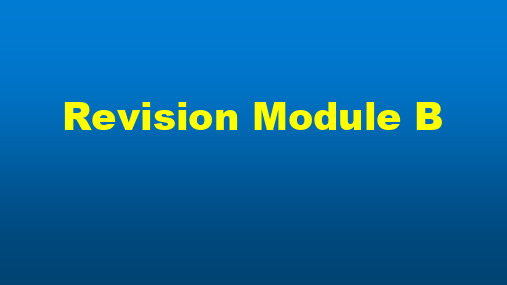
Present Continuous — Form
(疑问句) Am/Is/Are + 主语 + present participle + 宾语?
Present Continuous 疑问句
Am I
drinking juice?
Are you
drinking juice?
Is
he / she drinking juice?
4. Are people in Moscow going to work now? 5. Are people in New York having lunch now? 6. Is your cousin going to bed now? 7. Are you doing your homework?
(肯定句) 主语 + verb + 宾语. I speak Chinese.
(否定句) 主语 + do + not (don’t) + verb + 宾语. They don’t speak Chinese.
(疑问句) Do + 主语 + verb + 宾语? Do you speak Chinese?
Revision Module B
Do you remember this animal?
Does the tiger live in Asia? Yes, it does. What does the tiger eat? It eats meat.
Present Simple — Forms
Present Continuous
肯定句
I
am
You
are
初中英语外研版七年级下册《Revision_Module_B》课件

Today we went to Tower Bridge on the River Thamesand (8)l_oo_ked at the city. It’s very big! This afternoon we (9) _d_id____ some shopping. Jenny didn’t buy anything, but I (10 ) _b_o_u_g_h_t__ a present for you and I posted it just now. I hope you’ll like it! Say hello to your mum and dad.Emma
He (8) _r_o_d_e__( ride) his bike to school andhe (9) _t_ra_v_e_l_e_d_(travel) by train when hewent on holiday. He often (10) _h_a_d__( go)to the sea and (11) w__e_n_t__(swim) in the sea. He (12) _s_w_a_m_(have) a camera, but it (13) w__as_n__’t(not be ) a modern camera and he (14) _d_id_n_’_t_ta_k_e_( not take) colour photos.
3. They live a happy life today! ___W_h_a_t a__ha_p_p_y__ life they live today!
4. It was wonderful music. _W_h_a_t w_o_n_d_e_rf_ul_m_u_s_ic____ it was!
2020春外研版七年级英语下册课件-Revision module B
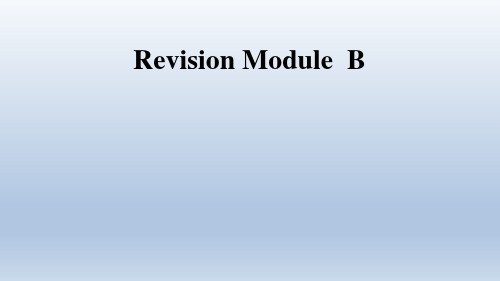
6 Match the pictures with their meaning. No talking. No running. No photos. No swimming.
Now explain these signs with don't.
Don't swim here, please.
Don't talk here, please.
5 Complete the passage with the correct form of the words. Seventy years ago, when my grandpa was young, life was
very different. Grandpa(1) listened (listen) to music but he (2) didn't watch (not watch)TV. He(3) played(play)the piano but he(4) didn't play (not play)computer games. He (5) had . (have) a telephone, but of course he(6) didn't send(not send)
was seven.
was seven.
5. Yes, I did. 5. Yes/No, . . .
/No, I didn't. did/didn't.
Questionnaire
Questions
My Answers
6. How did you go to 6. I went to
school when you
5. ride/a bike/to school/when you were eight?
七年级英语下册Revision module B课件

poor family in Denmark in 1805. His father (2) _d_ie_d___ when the boy was eleven. Hans (3) _tr_i_e_d_ a few jobs.
Finally, at the age of fourteen, he (4) _m__o_v_e_d__ to the capital of Denmark to work in the theatre. Then he (5) _w_e_n_t_ on to study and later he (6) _t_r_a_v_el_l_ed___ around Europe.
4 Complete the passage with the correct form
of the words and expression from the box.
be born become come die find go like move read travel try write Hans Christian Andersen was a famous writer of stories for children. He (1)_w_a_s__b_o_r_n into a
(listen) to music but he (2) _d_id__n_’t_w__a_t_ch_ (not watch) TV. He (3) _p_l_a_y_ed__ (play) the piano but he (4) _d_i_d_n_’_t _p_la_y_ (not play) computer games. He (5)
Revision module B
New words
slow feel ship
Finally, at the age of fourteen, he (4) _m__o_v_e_d__ to the capital of Denmark to work in the theatre. Then he (5) _w_e_n_t_ on to study and later he (6) _t_r_a_v_el_l_ed___ around Europe.
4 Complete the passage with the correct form
of the words and expression from the box.
be born become come die find go like move read travel try write Hans Christian Andersen was a famous writer of stories for children. He (1)_w_a_s__b_o_r_n into a
(listen) to music but he (2) _d_id__n_’t_w__a_t_ch_ (not watch) TV. He (3) _p_l_a_y_ed__ (play) the piano but he (4) _d_i_d_n_’_t _p_la_y_ (not play) computer games. He (5)
Revision module B
New words
slow feel ship
最新外研版初中七年级英语下册 Revision Module B课件

He (5) _____(have) a telephone, but of
course phela(6y) e__d_______(not send ) emails. His family (7) _________(not have) a cadr.idn’t play
had didn’t send
10. What sports did you like? I like playing basketball.
I was born in Jiaxing in 2000. I went to school at the age of seven. My school was No.1 Primary School. My home is near the school so I went to school on foot every day. I like playing basketball and I also play “Flight Chess” with my friend, Xiaoming. He is as old as I. He was from Chongqi . We were in the same class. We helped and learnt from each other. We were happy when we were in primary school.
When did you start school? 4.4.what school / go to when you were seven?
What school did you go to school when you were seven?
5.ride / a bike / to school / when you were eight?
course phela(6y) e__d_______(not send ) emails. His family (7) _________(not have) a cadr.idn’t play
had didn’t send
10. What sports did you like? I like playing basketball.
I was born in Jiaxing in 2000. I went to school at the age of seven. My school was No.1 Primary School. My home is near the school so I went to school on foot every day. I like playing basketball and I also play “Flight Chess” with my friend, Xiaoming. He is as old as I. He was from Chongqi . We were in the same class. We helped and learnt from each other. We were happy when we were in primary school.
When did you start school? 4.4.what school / go to when you were seven?
What school did you go to school when you were seven?
5.ride / a bike / to school / when you were eight?
外研版七下英语RevisionModuleB课件
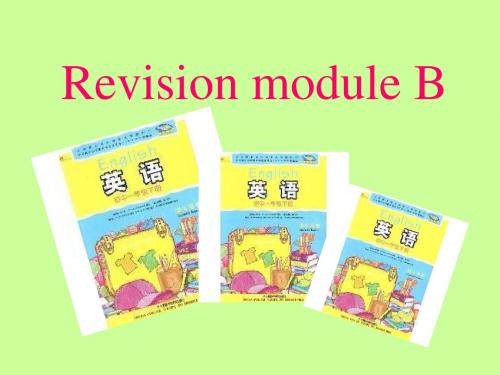
6. How did you go to school when you were eight?
I walked to school.
7. Who did you play with? I played with my friend, Xiaoming. 8. What games did you play ? We played ball games. 9. Why did you like this game? Because it is interesting.
very famous, like The Ugly Duckling and The Little Match Girl. People still (11)_li_k_e_
to read them today and they can (12) _r_e_ad_
them in many languages.
When did you start school? 4.what school / go to when you were seven?
What school did you go to school when you were seven?
5.ride / a bike / to school / when you were eight? Did you ride a bike to school when you were eight?
4. Complete the passage with the correct form of the words and expression.
be born become come die find go like move read travel try write
I walked to school.
7. Who did you play with? I played with my friend, Xiaoming. 8. What games did you play ? We played ball games. 9. Why did you like this game? Because it is interesting.
very famous, like The Ugly Duckling and The Little Match Girl. People still (11)_li_k_e_
to read them today and they can (12) _r_e_ad_
them in many languages.
When did you start school? 4.what school / go to when you were seven?
What school did you go to school when you were seven?
5.ride / a bike / to school / when you were eight? Did you ride a bike to school when you were eight?
4. Complete the passage with the correct form of the words and expression.
be born become come die find go like move read travel try write
外研(新标准)版七年级下Revision module B 教学课件 (共43张PPT)
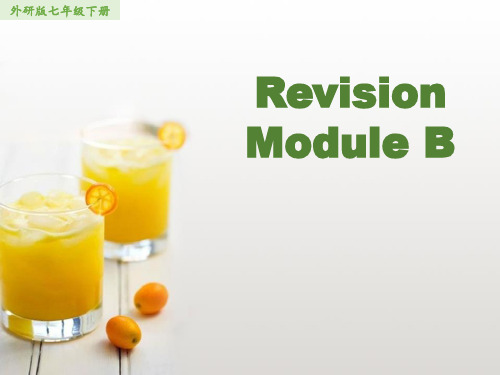
travel— traveled
die— died
read— read
find— found
write— wrote
Questions:
1. When did Fiona arrive in Qingdao? 2. Who is Carol? 3. Did Carol sit on the rock in Zhanqiao Park? 4. Who did Fiona meet yesterday? Where did they eat?
e.g. We arrived by train on Friday afternoon.
We didn’t by train on Friday afternoon.
arrive
We had dinner together in a Korean restaurant.
We didn’t
have
give went
to
the
park
and
had
a
picnic.
(改为一般疑问句)
__D_i_d__ __y_o_u__ ___g_o___ to the park and __h_a_v_e__ a picnic?
肯定回答: __Y_e_s____, ___w__e____ ____d_id____.
photos(彩色照片) and white photos
today.
in the past.
People listen to the music on the computer today.
People _lis_t_e_n_e_d to the music on the radio in the past.
初中英语外研版七年级下册《Revision module B》课件PPT
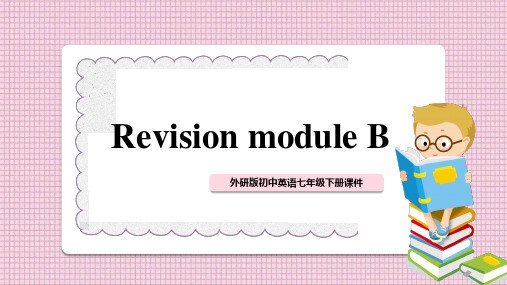
When did you start school? 4.what school / go to when you were seven?
What school did you go to school when you were seven?
Grammar and speaking
1. Write questions and make a questionnaire.
6. How did you go to school when you were eight?
I walked to school.
7. Who did you play with? I played with my friend, Xiaoming. 8. What games did you play ? We played “Flight chess”(飞行棋). 9. Why did you like this game? Because it is interesting.
Questions
My answers
My partner’s answers
When were you born? I was born on / in …. …was born on / in …
5.ride / a bike / to school / when you were eight?
Did you ride a bike to school 6.howwh/egno ytoouschwoeorle/ ewihgehnt?you were eight?
How did you go to school when you
7. whwoe/replaeyig/hwt?ith?
What school did you go to school when you were seven?
Grammar and speaking
1. Write questions and make a questionnaire.
6. How did you go to school when you were eight?
I walked to school.
7. Who did you play with? I played with my friend, Xiaoming. 8. What games did you play ? We played “Flight chess”(飞行棋). 9. Why did you like this game? Because it is interesting.
Questions
My answers
My partner’s answers
When were you born? I was born on / in …. …was born on / in …
5.ride / a bike / to school / when you were eight?
Did you ride a bike to school 6.howwh/egno ytoouschwoeorle/ ewihgehnt?you were eight?
How did you go to school when you
7. whwoe/replaeyig/hwt?ith?
外研版七年级英语下册Revision Module B 课件
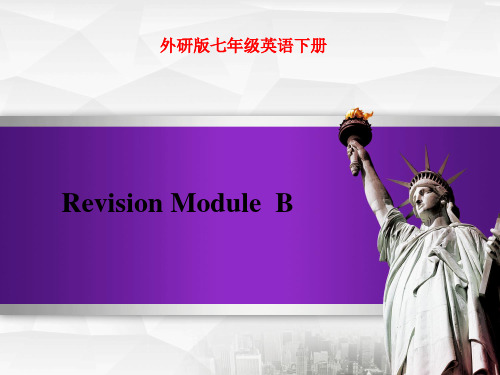
be born become come die find go like move read travel try write Then he (5) went on to study and later he (6) travelled . around Europe. His first book(7) came out in 1822. He (8) wrote . many stories for children, but older people also(9) found . them interesting. Many of his stories (10) became very famous, like The Ugly Duckling and The Little Match Girl. People still (11) like to read them today and they can (12) read them in many languages.
In China, people usually (1)shake handswhen they meet but in some countries, like Russia, people(2)kiss each other. People in the Middle East(3) stand close to each other, but people from the US don't. Chinese girls often walk(4) arm in arm . but people from Britain don't touch each other very often.
9 Complete the passage with the correct form of the expressions from the box. arm in arm kiss each other shake hands stand close People from different countries do things in different ways.
外研(新标准)版七年级下Revision module B 教学课件 (共22张PPT)
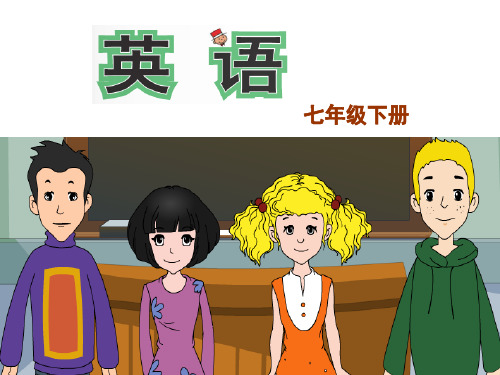
No talking. No running. No photos. No swimming.
Now explain these signs with don’t.
Don’t swim. Don’t talk. Don’t take photos.
Don’t run.
7 Rewrite the sentences with what.
1 The blues comes from America. It’s__sl_o_w___ ,sad music.
2 Our music teacher can play__m_o_d__er_n__ as well as traditional music.
3 We like pop music because it’s good __fu__n__. 4 Opera is a kind of play with_m__u_s_i_c___. 5 This song is really _b_e_a_u_t_i_fu_l__. I like it a lot. 6 This music makes me feel _s_a_d____.
10 Complete the email with the correct form of the words from the box. You can use some of the words twice.
arrive buy come do go have look take visit
computer games.He __h_a_d__ (have) a telephone, but of course he _d_i_d_n_’_t _s_e_n_d_ (not send) emails. His family _d_id_n_’_t_h_a_v_e_ (not have) a car. He __ro_d__e_ (ride) his bike to school and he _tr_a_v_e_l_le_d__(travel) by train when he went on holiday. He often _w__e_n_t_ (go) to the sea and _s_w_a_m__ (swim) in the sea. He _h_a_d__ (have) a camera, but it _w_a_s_n_’_t_ (not be) a modern camera and he _d_id__n_’t_t_a_k_e_ (not take) colour photos.
Now explain these signs with don’t.
Don’t swim. Don’t talk. Don’t take photos.
Don’t run.
7 Rewrite the sentences with what.
1 The blues comes from America. It’s__sl_o_w___ ,sad music.
2 Our music teacher can play__m_o_d__er_n__ as well as traditional music.
3 We like pop music because it’s good __fu__n__. 4 Opera is a kind of play with_m__u_s_i_c___. 5 This song is really _b_e_a_u_t_i_fu_l__. I like it a lot. 6 This music makes me feel _s_a_d____.
10 Complete the email with the correct form of the words from the box. You can use some of the words twice.
arrive buy come do go have look take visit
computer games.He __h_a_d__ (have) a telephone, but of course he _d_i_d_n_’_t _s_e_n_d_ (not send) emails. His family _d_id_n_’_t_h_a_v_e_ (not have) a car. He __ro_d__e_ (ride) his bike to school and he _tr_a_v_e_l_le_d__(travel) by train when he went on holiday. He often _w__e_n_t_ (go) to the sea and _s_w_a_m__ (swim) in the sea. He _h_a_d__ (have) a camera, but it _w_a_s_n_’_t_ (not be) a modern camera and he _d_id__n_’t_t_a_k_e_ (not take) colour photos.
外研版七年级英语下册Revision module B【创新课件】

Questionnaire My Answers
My partner’s answers
1. I was born on/in. . .
2. I was born in. . .
3. I started school. . .
4. I went to. . . school when I was seven.
5. ride/a bike/to school/when you were eight?
6. how/go to school/when you were eight?
7. who/play/with?
8. what games/play?
9. why/like/this game? 10. what sports/like?
for children. He (1) was born into a poor family in Denmark in 1805. His father (2) died when the boy was eleven. Hans(3) tried a few jobs. Finally, at the age of fourteen, he (4) moved to the capital of Denmark to work in the theatre.
10 Complete the email with the correct form of the words from the box. You can use some of the words twice.
5 Complete the passage with the correct form of the words. Seventy years ago, when my grandpa was young, life was
2013外研版七年级下册Revision-Module-B课件
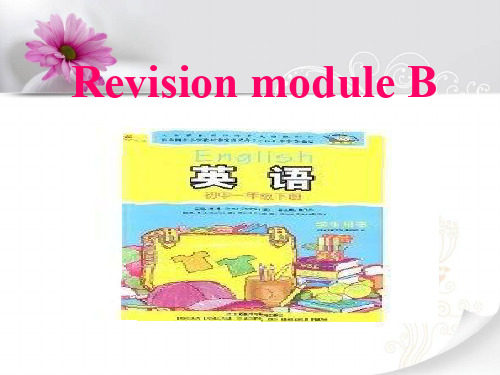
Henry, Hi! I’m on holiday in London with my friend Jenny. We (1)__a_rr_iv_e_d__by plane on Monday and (2) _t_o_o_k____ a taxi to our hotel in central London. I (3) __w_e_n_t ___ for a walk in Hyde Park but Jenny was tired so she didn’t (4) _c_o_m_e_____.
Hans Christian Andersen was a famous writer of stories for children. He (1)w__a_s_b_o_r_n_ into a poor family in Denmark in 1805. His father (2) __d_ie_d__ when the boy was eleven. Hans (3) _t_ri_e_d_ a few jobs. Finally, at the age of fourteen, hem(4o)v_e_d______ to the capital of Denmark to work in the theatre. Then he (5w)e_n__t __ on to study and later he (6t)r_a_v_e_l_e_d____ around Europe.
.
Don’t swim. No talking. No running. No photos. No swimming. Don’t talk. Don’t run. Don’t take photos.
Now explain these signs with don’t.
Hans Christian Andersen was a famous writer of stories for children. He (1)w__a_s_b_o_r_n_ into a poor family in Denmark in 1805. His father (2) __d_ie_d__ when the boy was eleven. Hans (3) _t_ri_e_d_ a few jobs. Finally, at the age of fourteen, hem(4o)v_e_d______ to the capital of Denmark to work in the theatre. Then he (5w)e_n__t __ on to study and later he (6t)r_a_v_e_l_e_d____ around Europe.
.
Don’t swim. No talking. No running. No photos. No swimming. Don’t talk. Don’t run. Don’t take photos.
Now explain these signs with don’t.
外研版七年级英语下册 Revision Module B课件

特殊疑问句:特殊疑问词+ 一般疑问句+? 回答:要求用完整的句子回答。如: Where was she born ? She was born in Tianjin. Which school did she study last year? She studied in No.1 Middle School.
Now explain these signs with don’t.
7. Rewrite the sentences with what.
1. It is a nice present. _W__h_at_a__ nice present it is!
2. It’s a fine day today. _W__h_a_t _a_f_in_e__d_a_y__ it is today!
I (You, He, She, They)did not work there.
一般疑问句: Did you ( I, he, she, they)work there?
肯定回答:主语+ did. 否定回答:主语+ didn’t.
be 动词: was / were
肯定句:I (He, She) was there. We (You, They) were there.
His first book (7) _c_a_m_e_ out in 1822. He (8)__w_r_o_te_ many stories for children, but older people also (9) __fo_u_n_d_ them interesting. Many of his stories (10) _b_e_c_a_me
否定句:I ( He, She,) was not there. We (You, They) were not there.
2020春外研版七年级英语下册课件-Revision module B

be born become come die find go like move read travel try write
he (4)movedto the capital of Denmark to work in the theatre. Then he (5) went on to study and later he (6) travelled . around Europe.
5 Complete the passage with the correct form of the words. Seventy years ago, when my grandpa was young, life was
very different. Grandpa(1) listened (listen) to music but he (2) didn't watch (not watch)TV. He(3) played(play)the piano but he(4) didn't play (not play)computer games. He (5) had . (have) a telephone, but of course he(6) didn't send(not send)
emails. His family(7) didn't have (not have)a car. He (8) rode . (ride)his bike to school and he(9) travelled (travel) by train when he went on holiday. He often (10) went (go)to the sea and (11) swam (swim)in the sea. He (12)___h_a_d____. (have) a camera, but it (13) wasn't (not be) a modern camera and he (14) didn't take (not take) colour photos.
外研社七下Revision module B课件
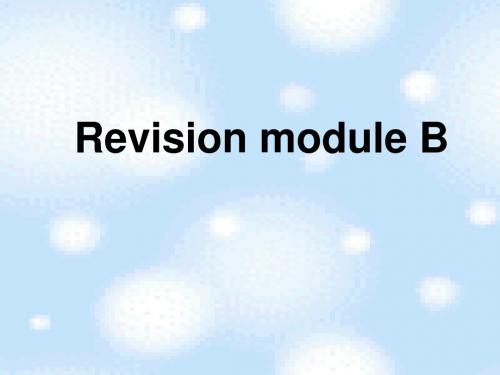
was So the theatre (6)_______ (be) very popular. William Shakespeare (7) wrote ______ (write) lots of successful plays. came Many people (8) ________ (come) enjoyed from all over London and (9) _______ (enjoy) his plays. Some of the people (10) weren’t (not be) rich, so they (11) ______ ___________ (not sit) in the theatre. didn’t sit stood They (12)_______ (stand) and (13) ________ (watch) the plays. watched
P83/ 11 Put these words into the correct column.
Places in a town or city
Transport
My home
bridge cinema hotel museum palace park restaurant shops theatre
P81/6 Complete the passage with the correct form of the words in brackets.
What was it like in London, when William Shakespeare lived there?
was Life in London in 1600 (1) ______ (be) very different from life there today. weren’t There(2) ________ (not be) any cars or walked buses. People (3)_________ (walk) didn’t have everywhere. People (4)_____________ (not have) television and they (5) didn’t go _________ (not go) to the cinema.
外研英语七年级下册Revision module B(共23张PPT)

4.What school did you go to when you were seven?
I studied in Zhaoben Primary School. 5. Did you ride a bike to school
when you were eight? No, I didn’t.
Who did you play with at the age of ten? 7. what games/play?
What games did you play ? 8. why / like /this game? Why did you like this game?
2. Work in pairs. Ask and answer the questions in Activity 1.
1
2
3
4
5
6
pick leave bring
picked left
brought
make like begin
made liked began
hurry buy take
hurried bought
took
swim win arrive
swam won
arrived
know stop find
Listening and speaking 11. Listen and choose the correct answer. 1. Tony went to London / Hong Kong.
2. It took four / five hours to get there. 3. Tony’s uncle / aunt met them at the
What school did you go to when you were seven? 5. ride / a bike / to school / when you were eight?
I studied in Zhaoben Primary School. 5. Did you ride a bike to school
when you were eight? No, I didn’t.
Who did you play with at the age of ten? 7. what games/play?
What games did you play ? 8. why / like /this game? Why did you like this game?
2. Work in pairs. Ask and answer the questions in Activity 1.
1
2
3
4
5
6
pick leave bring
picked left
brought
make like begin
made liked began
hurry buy take
hurried bought
took
swim win arrive
swam won
arrived
know stop find
Listening and speaking 11. Listen and choose the correct answer. 1. Tony went to London / Hong Kong.
2. It took four / five hours to get there. 3. Tony’s uncle / aunt met them at the
What school did you go to when you were seven? 5. ride / a bike / to school / when you were eight?
相关主题
- 1、下载文档前请自行甄别文档内容的完整性,平台不提供额外的编辑、内容补充、找答案等附加服务。
- 2、"仅部分预览"的文档,不可在线预览部分如存在完整性等问题,可反馈申请退款(可完整预览的文档不适用该条件!)。
- 3、如文档侵犯您的权益,请联系客服反馈,我们会尽快为您处理(人工客服工作时间:9:00-18:30)。
2. Work in pairs. Ask and answer the questions in Activity 1. --- When were you born? --- I was born twelve years ago.
1.When were you born ? I was born in 2000. 2.Where were you born ? I was born in Zhucheng. 3.When did you start school? I started school at the age of seven.
Revision module B
Grammar and speaking
一般过去时:表示过去某时间发生的动 作或情况(包括习惯性动作) be 动词有 was/ were 两个过去时,was 用于第一、 三人称单数,were 用于其他情况。 这个时态的三种结构如下:
一 般 I (You, He, She, They)worked there. 动 词 否定句: I (You, He, She, They)did not work there. 一般疑问句: Did you ( I, he, she, they)work there?
7. Who did you play with? I played with my friend, Xiaoming. 8. What games did you play ? We played ball games. 9. Why did you like this game? Because it is interesting.
6. Match the pictures with their meaning.
.
Don’t swim.
No talking. No running. No photos. No swimming. Don’t talk. Don’t run. Don’t take photos.
Now explain these signs with don’t.
5.ride / a bike / to school / when you were eight? Did you ride a bike to school when you were eight? 6.how / go to school / when you were eight? How did you go to school when you were eight? 7. who / play / with? Who did you play with? 8.what games/play? What games did you play ? 9.why / like /this game? Why did you like this game? 10.what sports / like?What sports did you like?
rode He (8) ______( ride) his bike to school and travelled he (9) ________(travel) by train when he went went on holiday. He often (10) _____( go) swam to the sea and (11) ______(swim) in the sea. He (12) had _____(have) a camera, but it (13) wasn’t _____(not be ) a modern camera and he didn’t take (14) _________( not take) colour photos.
came out in 1822. He His first book (7) _____ wrote many stories for children, but (8)______ found them older people also (9) ______ interesting. Many of his stories (10) became _____ very famous, like The Ugly Duckling and The Little Match Girl. People still (11)____ like read to read today and they can (12) ____ them in many languages.
Vocabulary
8. Complete the sentences with the words from the box.
肯定回答:主语+ did. 否定回答:主语+ didn’t.
肯定句:
be 动词: was / were
肯定句:I (He, She) was there. We (You, They) were there. 否定句:I ( He, She,) was not there. We (You, They) were not there. 一般疑问句: Was I (he, she ) there? Were you (we, they ) there? 肯定回答: 主语 + was / were. 否定回答: 主语 + wasn’t / weren’t.
10. What sports did you like?
I like playing basketball.
3. Write you and your partner’s answers on your questionnaire. I was born in Zhucheng in 2000. I went to school at the age of seven. My school was No.1 Primary School. My home is near the school, so I went to school on foot every day. I like playing basketball and I also play football with my friend, Xiaoming. He is as old as I. He was from Anqiu. We were in the same class. We helped and learnt from each other. We were happy when we were in primary school.
特殊疑问句:特殊疑问词+ 一般疑问句+? 回答:要求用完整的句子回答。如: Where was she born ? She was born in Tianjin. Which school did she study last year? She studied in No.1 Middle School. 特殊疑问词: what / when / who / whose / why / which / where / how / how many / how much / how long /how often / how soon.
5. Complete the passage with the correct form of the words. Seventy years ago, when my grandpa was young, life was very different. Grandpa listened (1)________(listen) to music but he didn’t watch not watch ) TV. He (2)___________( played (3)_______( play ) the piano but he (4) didn’t play _________(not play ) computer games. He (5) _____(have) a telephone, but of had didn’t send course he (6) _________(not send ) emails. didn’t have His family (7) _________(not have) a car.
1. Write questions and make a questionnaire.
Questions My answers My partner’s answers …was born on / in …
When were you I was born on / born? in ….
1.when / born? When were you born ? 2. where / born? Where were you born ? 3. when / start school? When did you start school? 4.what school / go to when you were seven? What school did you go to school when you were seven?
7. Rewrite the sentences with what.
1. It is a nice present. What a nice present it is! _______ 2. It’s a fine day today. _______________ What a fine day it is today! 3. They live a happy life today! What a happy life they live today! _____________ 4. It was wonderful music. What wonderful music it was! __________________
